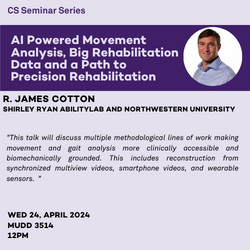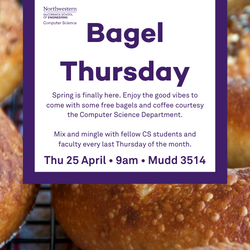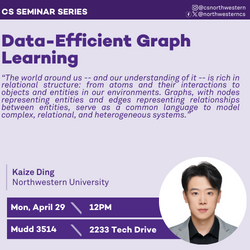News & EventsDepartment Events & Announcements
Events
-
Apr24
EVENT DETAILS
less
Wednesday / CS Seminar
April 24th / 12:00 PM
In Person / Mudd 3514Speaker
R. James Cotton, Northwestern University & Shirley Ryan AbilityLabTalk Title
AI Powered Movement Analysis, Big Rehabilitation Data and a Path to Precision RehabilitationAbstract
This talk will discuss multiple methodological lines of work making movement and gait analysis more clinically accessible and biomechanically grounded. This includes reconstruction from synchronized multiview videos, smartphone videos, and wearable sensors. We will also discuss how implicit functions provide a powerful representation to map from time to joint angles, and GPU accelerated methods that enable end-to-end biomechanical fits from these different modalities. It will discuss some of the opportunities that large movement data enables, including the use of self-supervised learning to discover gait representations that can function as both diagnostic and response biomarkers. Finally, we will outline a vision for a Causal Framework for Precision Rehabilitation that can model this data to link from impairment to function and identify the optimal dynamic treatment policies to improve rehabilitation outcomes.Biography
I am an electrical engineer, neuroscientist, and physiatrist working as a physician-scientist at Shirley Ryan AbilityLab and Assistant Professor in the Northwestern University Department of Physical Medicine and Rehabilitation. I completed my residency in PM&R at Shirley Ryan AbilityLab (formers Rehabilitation Institute of Chicago) where I remained as faculty. Prior to that I obtained a B.S. in Electrical Engineering from Rice University followed by an MD and PhD in systems neuroscience from Baylor College of Medicine. My lab works at the intersection of artificial intelligence, wearable sensors, computer vision, causal and biomechanical modeling, and novel technologies to more precisely monitor and improve rehabilitation outcomes.Research Area/Interests
AI, computer vision, gait analysis, wearable sensors, rehabilitationTIME Wednesday, April 24, 2024 at 12:00 PM - 1:00 PM
LOCATION 3514, Mudd Hall ( formerly Seeley G. Mudd Library) map it
CONTACT Wynante R Charles wynante.charles@northwestern.edu EMAIL
CALENDAR Department of Computer Science (CS)
-
Apr25
EVENT DETAILS
less
Spring is finally here. Enjoy the good vibes to come with some free bagels and coffee courtesy the Computer Science Department. Mix and mingle with fellow CS students and faculty every last Thursday of the month.
TIME Thursday, April 25, 2024 at 9:00 AM - 11:00 AM
LOCATION 3514, Mudd Hall ( formerly Seeley G. Mudd Library) map it
CONTACT Wynante R Charles wynante.charles@northwestern.edu EMAIL
CALENDAR Department of Computer Science (CS)
-
Apr29
EVENT DETAILS
less
Monday / CS Seminar
April 29th / 12:00 PM
Hybrid / Mudd 3514Speaker
Kaize Ding, Northwestern UniversityTalk Title
Data-Efficient Graph Learning
Abstract
The world around us -- and our understanding of it -- is rich in relational structure: from atoms and their interactions to objects and entities in our environments. Graphs, with nodes representing entities and edges representing relationships between entities, serve as a common language to model complex, relational, and heterogeneous systems. Despite the success of recent deep graph learning, the efficacy of existing efforts heavily depends on the ideal data quality of the observed graphs and the sufficiency of the supervision signals provided by the human-annotated labels, leading to the fact that those carefully designed models easily fail in resource-constrained scenarios.In this talk, I will present my recent research contributions centered around data-efficient learning for relational and heterogeneous graph-structured data. First, I will introduce what data-efficient graph learning is and my contributions to different research problems under its umbrella, including graph few-shot learning, graph weakly-supervised learning, and graph self-supervised learning. Based on my work, I will elucidate how to push forward the performance boundary of graph learning models especially graph neural networks with low-cost human supervision signals. I will also touch upon the real-world applications of data-efficient graph learning to different domains and finally conclude my talk with a brief overview of my future research agenda.
Biography
Kaize Ding is an Assistant Professor in the Department of Statistics and Data Science at Northwestern University. Before joining Northwestern, he obtained his Ph.D. degree in Computer Science at Arizona State University in 2023 under the supervision of Prof. Huan Liu. His research interests are generally in data mining, machine learning, and natural language processing, with a particular focus on graph machine learning, data-efficient learning, and reliable AI. His work has been published in top-tier conferences and journals (e.g., AAAI, EMNLP, IJCAI, KDD, NeurIPS, TheWebConf, and TNNLS), and has been recognized with several prestigious awards and honors, including the AAAI New Faculty Highlights, SDM Best Posters Award, Best Paper Award at the Trustworthy Learning on Graphs workshop, etc.Research Area/Interests
Data Mining; Machine Learning; Natural Language ProcessingZoom: https://northwestern.zoom.us/j/99555833103?pwd=TEtaakVGL2xUYytDa2Nvbk14Z3VhUT09
TIME Monday, April 29, 2024 at 12:00 PM - 1:00 PM
LOCATION 3514, Mudd Hall ( formerly Seeley G. Mudd Library) map it
CONTACT Wynante R Charles wynante.charles@northwestern.edu EMAIL
CALENDAR Department of Computer Science (CS)
-
May1
EVENT DETAILS
lessTBA
TIME Wednesday, May 1, 2024 at 12:00 PM - 1:00 PM
LOCATION 3514, Mudd Hall ( formerly Seeley G. Mudd Library) map it
CONTACT Wynante R Charles wynante.charles@northwestern.edu EMAIL
CALENDAR Department of Computer Science (CS)
-
May3
EVENT DETAILS
lessTBA
TIME Friday, May 3, 2024 at 12:00 PM - 1:00 PM
LOCATION 3514, Mudd Hall ( formerly Seeley G. Mudd Library) map it
CONTACT Wynante R Charles wynante.charles@northwestern.edu EMAIL
CALENDAR Department of Computer Science (CS)
-
May8
EVENT DETAILSmore info
lessThe Center for Scientific Studies in the Arts is a collaboration between the Art Institute of Chicago and materials science-related departments at Northwestern University to pursue objects-based and objects-inspired scientific research. Materials research benefits ongoing work in conservation, archaeology, art history, and curatorial scholarship.
Learn how the Center uses materials research to care for art objects in sustainable, innovative ways with Maria Kokkori, Senior Scientist in the Center for Scientific Studies in the Arts. She will be in conversation with Corey Byrnes, Northwestern Associate Professor of Chinese Culture and co-founder/co-director of the Environmental Humanities Workshop in Kaplan Humanities Center.
This event is presented by the McCormick School of Engineering and Applied Science in conjunction with exhibition Actions for the Earth: Art, Care & Ecology.
TIME Wednesday, May 8, 2024 at 6:00 PM - 7:30 PM
LOCATION Block Museum of Art, Mary and Leigh map it
CONTACT Block Museum of Art block-museum@northwestern.edu EMAIL
CALENDAR Block Museum of Art
-
May30
EVENT DETAILS
lessTBA
TIME Thursday, May 30, 2024 at 9:00 AM - 11:00 AM
LOCATION 3514, Mudd Hall ( formerly Seeley G. Mudd Library) map it
CONTACT Wynante R Charles wynante.charles@northwestern.edu EMAIL
CALENDAR Department of Computer Science (CS)
-
May30
EVENT DETAILS
lessTBA
TIME Thursday, May 30, 2024 at 3:00 PM - 5:00 PM
LOCATION TBA, Mudd Hall ( formerly Seeley G. Mudd Library) map it
CONTACT Wynante R Charles wynante.charles@northwestern.edu EMAIL
CALENDAR Department of Computer Science (CS)
-
Jun10
EVENT DETAILSmore info
lessMcCormick School of Engineering PhD Hooding and Master’s Degree Recognition Ceremony
TIME Monday, June 10, 2024 at 9:00 AM - 11:00 AM
LOCATION Welsh-Ryan Arena
CONTACT Amy Pokrass amy.pokrass@northwestern.edu EMAIL
CALENDAR McCormick School of Engineering and Applied Science
-
Jun10
TIME Monday, June 10, 2024 at 2:00 PM - 4:00 PM
LOCATION Welsh-Ryan Arena
CONTACT Amy Pokrass amy.pokrass@northwestern.edu EMAIL
CALENDAR McCormick School of Engineering and Applied Science
